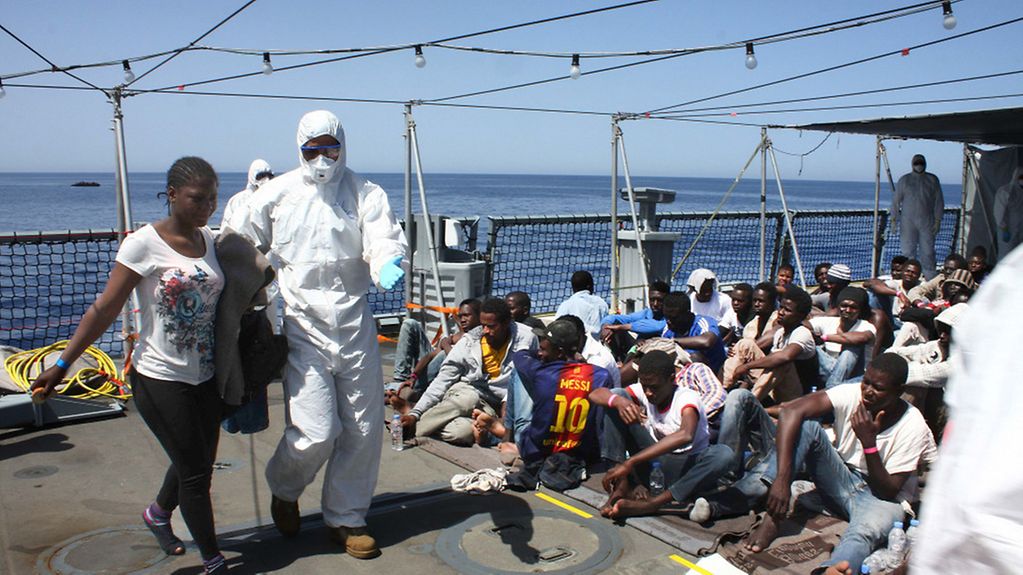Refugee crisis in the Mediterranean
Chancellor Angela Merkel has pointed to Germany’s humanitarian efforts in the Mediterranean. Germany is doing its bit to rescue refugees in distress at sea, she said. Angela Merkel added that all action against human traffickers must be in line with international law.
3 min reading time

The frigate Hessen has already saved more than 700 people in distress at sea
Photo: Bundeswehr/Jonack
At a joint press conference following the Petersberg Dialogue, Angela Merkel and François Hollande spoke of the current policy on migration and refugees. With a view to the latest proposals of the European Commission on refugee and asylum policy, Angela Merkel underlined the consultation and coordination taking place between Germany and France.
Humanitarian operations in the Mediterranean have been stepped up. Germany is doing its bit to rescue refugees in distress at sea, she reported. It is essential to combat the human traffickers, said Angela Merkel, "but this is only possible in line with international law". "We need a UN Security Council Resolution." We are still a long way from achieving a solution, she added.
Fighting the root causes
The Chancellor stressed the need to fight the root causes of the mass exodus of refugees trying to reach Europe. She pointed to the forthcoming meeting with the African Union. "We will be engaging extremely actively together." Now that the British elections are over, talks will also be held with British colleagues. She announced close collaboration between Germany and France in this regard, and with respect to the proposals made by the European Commission on migration and refugee policy. "The two ministers of the interior are to draw up common ideas.
We agree that we must go beyond Dublin, in view of the challenges we face." A great many details still need to be clarified though.
The Dublin Regulation establishes a hierarchy of criteria for identifying the member state responsible for examining an asylum claim in Europe. This ensures that every claim for asylum is examined by only one member state.
EU ministers consult on sea rescue operations
One day earlier (Monday, 18 May 2015), EU ministers of foreign affairs and defence had met in Brussels to consult on the refugee crisis. In particular they discussed stepping up rescue operations at sea. Fighting criminal networks of human smuggles and traffickers was another item on the agenda.
Participants discussed an EU mission under the umbrella of the Common Security and Defence Policy (CSDP). The operation is to be conducted in sequential phases. Initially the focus will be on surveillance and assessment of the situation in the Mediterranean.
Creating a legal basis for the CSDP mission
Certain legal preconditions must be met for an operation of this sort. Federal Foreign Minister Frank-Walter Steinmeier declared that a lot must still be clarified, both in legal and practical terms. Above all the UN Security Council must adopt a resolution to this end. Intensive efforts in this direction are ongoing, he said. "We depend on the permanent members of the Security Council not using their veto," said Frank-Walter Steinmeier.
Saving lives is paramount
"We must save people from drowning," declared the Federal Foreign Minster, and stressed that this is exactly what Germany has been doing for two weeks. The German government has sent two naval vessels to the Mediterranean. So far, the German naval vessels have responded to five emergencies at sea, and have rescued more than 700 people. The refugees were handed over to the Italian authorities at Reggio Calabria on the Italian mainland and Pozzallo in Sicily.
The German frigate Hessen is currently patrolling the Mediterranean north of the Libyan coast. The combat support ship Berlin is in the port of Taranto but due to leave again soon.
Abandoned boats are a hazard for shipping
During the sea rescue operations, abandoned boats have also been sunk – five inflatables and one wooden boat – because abandoned boats are a hazard for shipping. Their size and lack of lights make them effectively invisible at night even in good weather. If a rescue vessel were to collide with one of the abandoned boats it could sustain rudder or engine damage.
It is also important during sea rescue operations to find overfilled boats quickly and to get to them as rapidly as possible. It is not immediately obvious from aerial surveillance or from a long distance whether or not people are on board a boat. By the time a rescue craft establishes that a boat is abandoned it might to too late to save others.